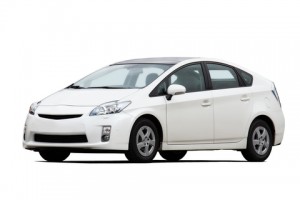Size matters, but not as much as you think. When it comes to fuel-efficient cars, the best ones have a combination of good aerodynamics, lightweight, low drive line, and a small or medium-size engine.
Eco-friendly cars are the way of the future. More vehicle, parts, and tire manufacturers are coming up with new and creative ways to offer consumers the best fuel-efficient and environmentally-sound cars. Not only do these eco-vehicles save on gas and energy, they do their part for environmental carbon reduction. FuelEconomy.gov reports 1.6 billion metric tons of greenhouse gases are emitted into the atmosphere by highway vehicles each year. That’s 20 pounds of carbon dioxide per gallon of gas. Drivers who choose hybrid and electric vehicles greatly reduce the amount of carbon emissions entering the atmosphere which helps slow climate change.
Motorists may not be able to get their hands on the VW XL1 quite yet, but can still make savvy decisions to wring the best mileage from vehicles fitting the following criteria.
VW claims the XL1 is the most fuel efficient car ever with an estimated 261 mpg.
Vehicle Aerodynamics
Optimal fuel economy requires a vehicle that is aerodynamic. Aerodynamic designs look sleek and can improve fuel efficiency by one mile per gallon, when compared to vehicles that do not move through the air as easily.
The visual profile of a vehicle can help determine whether it is aerodynamic or not. Although some exceptions exist, a boxy shape is usually less aerodynamic than vehicles with a slight curve. Look for cars that curve along the top and back. Avoid vehicles with a clear box-type shape, which will require more effort to move forward.
Use vehicles lower to the ground. Cars with less air flowing below will not be slowed down or fight against wind on the top and bottom of the vehicle.
Vehicle Weight
The weight of the vehicle plays a significant role in fuel efficiency. As a general rule, a heavier car or truck will have a lower mile per gallon, on average, than a lighter vehicle. Tirebuyer.com advises against purchasing a heavy vehicle, like a van or truck, unless it is necessary for your job, family or terrain. It is more fuel efficient to select a Sedan, compact vehicle or Coupe.
Select a vehicle that has a lower weight, if possible. Even if you need a larger vehicle, look at the weight of the vehicle and compare it. An extra 100 pounds in your vehicle will cause your fuel efficiency to drop by roughly two percent. Pay attention to the weight of the vehicle when you are making a selection to get better gas mileage within the specific class of vehicles.
Even the type of tires you buy can affect the weight and fuel efficiency of your vehicle. Under-inflated tires can make your car work harder and use more gas. Nitrogen-inflated tires lose air four times slower than air-inflated tires that also contain oxygen and water. Inflating your tires with nitrogen is also safer and improves tire wear and rim life.
Select a Vehicle With Low Drive Line Weight
Drive line weight is the weight of moving components within your vehicle. Whether you currently own a vehicle or want to buy a new car, changing out the axles, flywheel, crank shaft and other moving parts for lighter options will reduce your fuel expenses.
Stopping and Starting
Even if you select a vehicle that is designed to have better mileage, your actions behind the wheel will impact your fuel efficiency. The law of inertia states that objects in motion will continue moving until an external force causes it to stop. In the case of a vehicle, applying the brakes will cause it to stop. Unfortunately, if you are constantly stopping and then forcing the car into motion again, it will make your fuel efficiency drop.
The U.S. Department of Energy suggests that aggressive driving will actually reduce your fuel economy by roughly 33 percent. Drive at the speed limit to reduce the impact on your fuel.
Engine size and the amount of horsepower within a vehicle are only one factor that impacts your gas mileage. Before you buy a new car, take the weight of the vehicle and the aerodynamic design into account.







